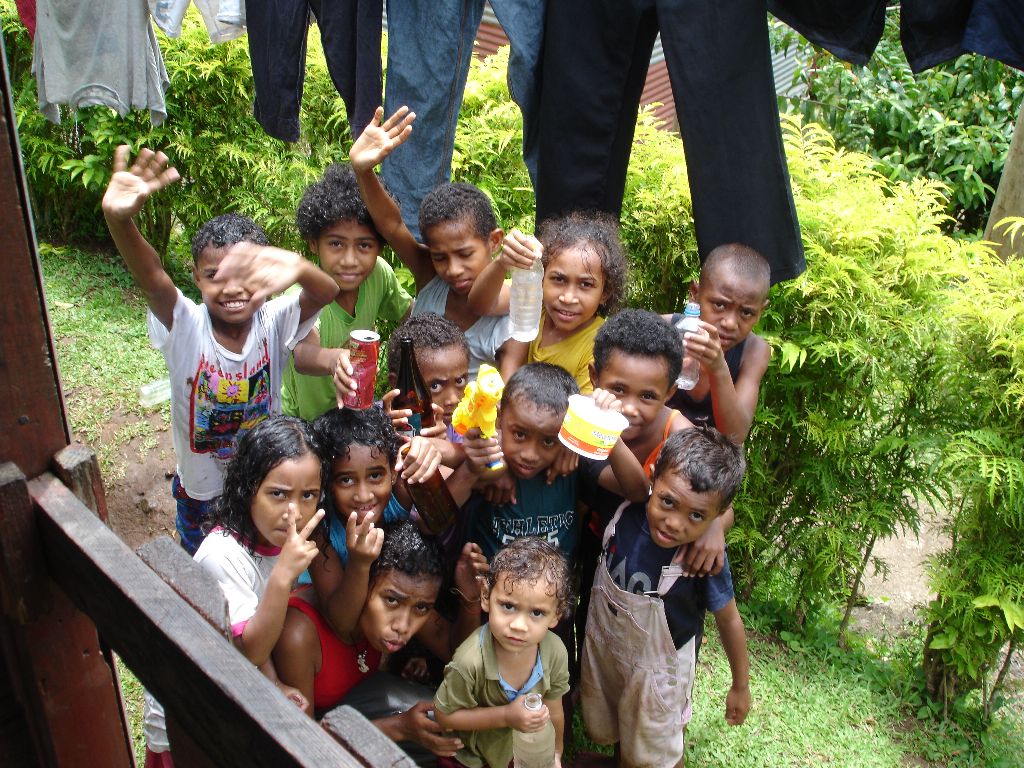Where to begin on the culture...here's a quick Fiji 101 - Although Wikipedia may well be the best source pof info here

Fiji is a group of over 300 islands, north east from New Zealand...it crosses the 180 degree line. It is part of Melanesia, a stretch of islands which was inhabited some 40000 years ago they guess, by migrating peoples originating from Tanzania many 1000s of years before that. Fiji's first language has been English ever since High Chief Cakabau asked for British governance in 1874 with the Deed of Session signed in the place were all those photos were taken, Levuka, Ovalau - the old capital. 1970 I think was when they became an independent state.
Relationships
Tavale: My wife's sisters and brothers are my "tavale", I guess a cousin-in-law, they can tease me and likewise I do it back. It is expected to be honest, to be nice to your tavale would get you a lot of stick. I guess this relationship is there so that rather than having problems that are unavoidable they are put out in the open.
Karua: Other men / women married to my wife's brothers and sisters are classed as my "Karua", they are treated like real life brothers and sisters, bringing the wider family together. I can go to any karua and ask for help, a place to stay etc and there wouldn't be any question...I am also expected to behave the same way also...very few but some will try and take advantage of this, and that's were you cheat and get "closer" tavales on your side to help
Momo/Nei: My wife's father and mother are my uncle and auntie (momo and nei), in the truest tradition I shouldn't speak to them or look them in the eye, it is disrespectful, however I am the kaivalagi (european) son-in-law so the rules get bent somewhat, I still talk through Maraia sometimes, definitely when at traditional ceremonies. The same would be the other way around had me and my parents been Fijian. I am a Momo to all my male Tavale's and female Karua's sons and daughters, all my Tavale's parents are my Momo/Nei too.
Ta/Na: My wife's sisters/brother's partners (Karua's) parents are my parents, and the father (Ta) and mother (Na) can be looked to for advice and will look after me in times of trouble. I am a Ta to all my male Karua's and female Tevale's sons and daughters, all my Karau's parents are my Ta/Na too.
The relationships actually branch out much further than that, if I have a Momo/Nei, thier tevales will be my Ta/Na, likewise a Ta/Na's tevales will be my Momo/Nei...
There is more but I think that's enough, hopefully I didn't lose you there
Wikipedia link of some of this stuff:
http /en.wikipedia...._and_ceremonies
Food
/en.wikipedia...._and_ceremonies
Food
Traditional Fijian food is just plain awesome

The most traditional of foods is cooked in an earth oven (or "Lovo"). You first dig a hole and fill it will special stones then wood on top of that. You start a fire and wait until the wood is ash and the stones are red hot, then you place the prepared food on top. The food is traditionally weaved into coconut palm leaves and banana leaf stems are weaved to form a grill...but these days a bit of tin foil is used quite often

The whole thing is then covered with banana leaves, then flour sacks or just more banana leaves and buried for 2 hrs. This sort of thing is done for weddings, deaths, birthdays, anniversaries etc.
The sort of things that go into a lovo that I love are:
- Freshly killed pig picked from a pig sty a stones through away
- Fresh fish wrapped in banana leaf with chillis and citrus juices
- Whole chicken (locally corn fed of course)
- Palusami - corned beef or tune flakes mixed with onion, ginger, garlic and coconut cream and wrapped in Taro leaves
- Dalo (Taro root)
- Cassava
- Yam
- Breadfruit
Wikipedia link:
http /en.wikipedia.org/wiki/Lovo
Drinking
/en.wikipedia.org/wiki/Lovo
Drinking
The local brew everyone drinks is called Yaqona, other wise known as grog or Kava...it is made from the root of a pepper tree...that big wooden bowl you saw further up is used to drink it.
The root is first cleaned, chopped and then sun dried. Once dry (very very important) it is then pounded into a powder. This powder is put into a meslin cloth and mixed through water to create a muddy concoction. This water doesn't taste great but sure does affect you. Getting drunk isn't like alcohol - your body goes numb starting with the tongue, but your thought processes remain sharp, in fact they sharpen I'd say. For thinking slows down and clarifies some what. It was traditionally used for a drink between village chiefs to discuss a truce etc as it stopped them coming to blows...it is very relaxing.
There is a strict order maintained when drinking from the bowl in a group, normally only one person drinks at one time and everyone claps several times to acknowledge it...the Yaqona ceremonies are one of my favourite things about Fijian culture, they bring people together a lot and create a real sense of community throughout the area. Anyone walking past is invited to join the drinking, it is a great way to socialise.
Wikipedia link:
http /en.wikipedia.org/wiki/Kava
/en.wikipedia.org/wiki/Kava
Have a look at my Meet The Members post to see me wearing a traditional Fijian wedding dress...yes I got married in a dress































 /en.wikipedia...._and_ceremonies
/en.wikipedia...._and_ceremonies


 Do different generations live together in the same house?
Do different generations live together in the same house?